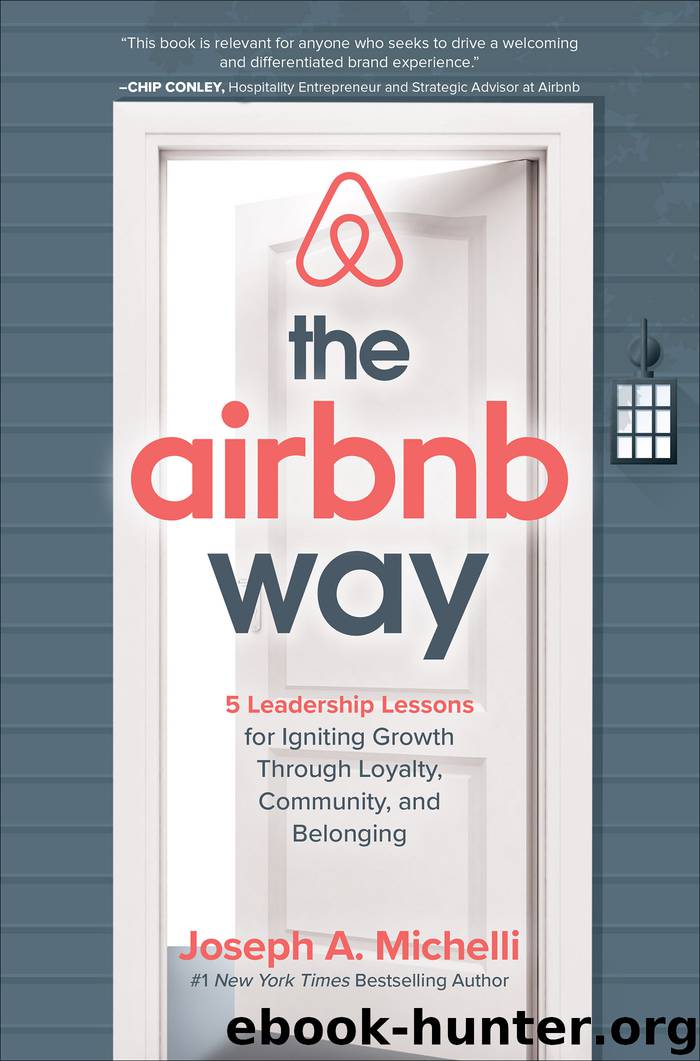The Airbnb Way: 5 Leadership Lessons for Igniting Growth through Loyalty, Community, and Belonging by Joseph Michelli

Author:Joseph Michelli [Joseph Michelli]
Language: eng
Format: epub
Publisher: McGraw-Hill
Published: 2019-09-10T16:00:00+00:00
PART IV
empowerment
Maximize Impact
It turns out that advancing equal opportunity and economic empowerment is both morally right and good economics.
—William J. Clinton, forty-second president of the United States
In earlier chapters I’ve outlined how Airbnb leaders aspire to create belonging, trust, and hospitality. We’ve explored how Airbnb is positioned to be a “people business aided by technology” and how it’s dedicated to a mission of creating a world where anyone can Belong Anywhere. We’ve also reviewed Airbnb’s meteoric financial success as evidenced by profitability that was attained well before Uber or Lyft.
Harsh critics of capitalism might argue that a company like Airbnb can’t achieve rapid economic success and authentically pursue a lofty social mission concerning human acceptance and belonging. In their book Conscious Capitalism, Whole Foods CEO John Mackey and Professor Raj Sisodia note, “Capitalism and business are all too frequently vilified as the bad guys and blamed for virtually everything our postmodern critics dislike about the world. Capitalism is portrayed as exploiting workers, cheating consumers, causing inequality by benefiting the rich but not the poor, homog-enizing society, fragmenting communities, and destroying the environment. . . . This is a fundamentally misguided view.”
In this chapter we will explore how Airbnb leaders are challenging negative portrayals of “for-profit” businesses. Chapter 10 will examine how Airbnb is seeking to strengthen communities, protect the environment, and provide humanitarian relief.
Since this is a chapter about Airbnb’s efforts to drive entrepreneurship, economic opportunity, and employee engagement, let’s frame our discussion in the context of social capitalism. Tristan Claridge, founder of Social Capital Research and Training, defines social capitalism as a “socially minded form of capitalism, where the goal is making social improvements, rather than focusing on accumulating capital in the classic capitalist sense. It is a utilitarian form of capitalism with a social purpose.”
In the pages ahead, we’ll look at Airbnb’s “social purpose” from the perspective of how it has improved economic opportunities for it’s employees and the host community. In Chapter 9, we will hear from Airbnb hosts and employees who have been empowered and who empower others.
So what is the meaning of “empowerment”? The origin of the word empower dates as far back as the 1400s and can be found in John Milton’s 1667 classic poem Paradise Lost. Despite a lengthy history, the concept of empowerment started to gain traction in a broader social context less than 50 years ago. In an article for the Journal of Extension titled “Empowerment: What Is It?,” authors Nanette Page and Cheryl Czuba define it this way:
Empowerment is a construct shared by many disciplines and arenas: community development, psychology, education, economics, and studies of social movements and organizations, among others. . . . The meaning of the term empowerment is often assumed rather than explained or defined.
As a general definition, however, we suggest that empowerment is a multi-dimensional social process that helps people gain control. . . .
It is a process that fosters power . . . in people, for use in their own lives, their communities, and in their society, by acting on issues that they define as important.
Download
This site does not store any files on its server. We only index and link to content provided by other sites. Please contact the content providers to delete copyright contents if any and email us, we'll remove relevant links or contents immediately.
Life 3.0: Being Human in the Age of Artificial Intelligence by Tegmark Max(5547)
The Sports Rules Book by Human Kinetics(4379)
The Age of Surveillance Capitalism by Shoshana Zuboff(4275)
ACT Math For Dummies by Zegarelli Mark(4043)
Unlabel: Selling You Without Selling Out by Marc Ecko(3658)
Blood, Sweat, and Pixels by Jason Schreier(3614)
Hidden Persuasion: 33 psychological influence techniques in advertising by Marc Andrews & Matthijs van Leeuwen & Rick van Baaren(3552)
The Pixar Touch by David A. Price(3431)
Bad Pharma by Ben Goldacre(3422)
Urban Outlaw by Magnus Walker(3392)
Project Animal Farm: An Accidental Journey into the Secret World of Farming and the Truth About Our Food by Sonia Faruqi(3212)
Kitchen confidential by Anthony Bourdain(3080)
Brotopia by Emily Chang(3049)
Slugfest by Reed Tucker(2997)
The Content Trap by Bharat Anand(2917)
The Airbnb Story by Leigh Gallagher(2851)
Coffee for One by KJ Fallon(2630)
Smuggler's Cove: Exotic Cocktails, Rum, and the Cult of Tiki by Martin Cate & Rebecca Cate(2520)
Beer is proof God loves us by Charles W. Bamforth(2453)
